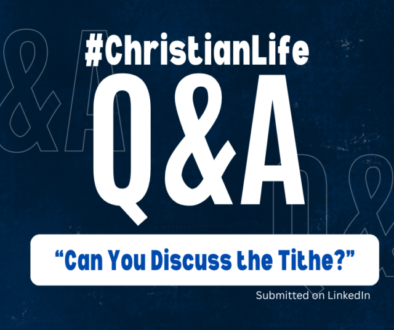In the Christian world the word “gospel” is thrown around a lot. We believe the gospel. We preach the gospel. We share the gospel. We stand on the gospel. And so on… The question I have, however, is with a word used so often, how many people actually know what it means?
When I say “the gospel,” what am I talking about?
A Basic Definition
In the Greek New Testament, the word gospel is taken from the word, “euangelion.” We get our word evangelism from a similar Greek word, “evangelizo.” While the english understanding of the word gospel is typically translated as “good news,” the reality of the original context is that this is a “good news that is shared.” It is the “good news brought by the evangelist or angel (messenger).”
What I want us to grasp is that in the New Testament, the word “gospel” is generally used to describe the proclamation of the good news, rather than just the idea of the good news itself. In other words, it is not a “gospel” unless and until it is proclaimed!
The original idea comes from a message of victory being declared over a nation at war. As the Theological Lexicon of the New Testament says,
In secular Greek, angelos was “messenger” (especially of the gods) and angelia “message.” Euangelos referred to “one who bears good news,” a messenger of joy… Usually, the announcement concerns victory and peace: the bringer of good news (euangelos) arrives from the battlefield, sometimes by ship, sometimes by horse or by letter, but also on foot, by a runner.
Ceslas Spicq and James D. Ernest, Theological Lexicon of the New Testament (Peabody, MA: Hendrickson Publishers, 1994), 82.
Therefore, when we say “Gospel” what we are actually discussing is the announcement of Jesus’ victory through His sinless life, death on the cross and resurrection from the dead.
God’s Gossip
The English form of the word “gospel” comes from an Old English word, “godspel,” or literally “good spell” meaning “good story.” To share a godspel was to tell a good story that would capture the attention and possibly altar the course of a person’s life.
Interestingly, the English word “gospel” comes from a similar root as the English word “gossip,” which means sharing a “good story” about a “sib,” as in a sibling or relative.
Obviously we would say that gossiping about our relatives, friends, or acquaintances is wrong. However, the truth is that when the “gossip” is about our brother Jesus, then it is good news to share – gospel.
The point I want to make is that the Gospel is not something that can be kept to oneself. There is no “gospel” if it is not being proclaimed, the same as there is not “gossip” if people keep their mouths shut!
God wants us to “gossip” the story of Jesus.
Paul’s Gospel
Just look at how the Apostle Paul talks about the Gospel. He does so in very specific terms:
Now I would remind you, brothers, of the gospel I preached to you, which you received, in which you stand, and by which you are being saved, if you hold fast to the word I preached to you—unless you believed in vain. For I delivered to you as of first importance what I also received: that Christ died for our sins in accordance with the Scriptures, that he was buried, that he was raised on the third day in accordance with the Scriptures,
1 Corinthians 15:1-4
He says the gospel is something that:
- Is “preached” or proclaimed; also “delivered”
- Is “received” or heard
- Gives the ability to “stand” and “saves” — again, this is the idea of the message being a declaration of victory over your enemy.
- Is a message that must be “held fast” — not traded for other “truths” being taught. Don’t fall under someone else’s “spell” or story.
The Gospel Must Be Shared
In almost every case, the word “gospel” is used in the New Testament with the understanding that this is a message to be proclaimed. This is why Paul’s line of questioning in Romans 10:14 deals with preaching:
How then will they call on him in whom they have not believed? And how are they to believe in him of whom they have never heard? And how are they to hear without someone preaching?
The truth is that we live in a world where the gospel is available to most of humanity, if they were to search it out. Through internet, websites, podcasts, bible apps, radio, television, etc, a major portion of the world could discover the gospel on their own. Every single day, that availability grows. Yet at the most foundational level of what the gospel is, that plan can never work!
God’s intention from the beginning was that the gospel of Jesus Christ would be transferred from person to person by proclaiming and hearing. People, by nature, are not looking for a savior. The sinful, human heart makes its own plans and strategies for overcoming every negative thing in life. Even those who recognize sin, seek to justify themselves by “doing good.”
God’s good news, however, is that the battle is already won. Though it is not a message people are seeking, it is one that will change their eternal reality once it comes to them. It must be shared!
Just as gossip ceases to exist when people stop sharing it, so does the gospel. It becomes useless; having no effect in bringing people into salvation. The truth is, you cannot have a gospel unless it’s proclaimed.
You Are Already Commissioned to Preach
The day you became a Christian by believing this gospel, you received a commission to share it with others. You cannot “hold to the gospel” without sharing the gospel. Just look at passages like Matthew 28:18-20, Mark 16:15-18, and Acts 1:8
What I want to do, over the next few weeks, is help you find your voice in sharing the gospel with others. My goal in this series is that you will feel better equipped to share the good news of Jesus Christ with your family, friends, and anyone else God brings across your path. You don’t have to be an evangelist to be a witness for Christ. You simply have to be willing to open your mouth.
In the next two posts, we will look at two basic ways you can express the gospel, in simple terms, that will help people understand the message you share. (First one is here.)
After that, we will talk about the importance of your own testimony in sharing the gospel story. The gospel is our “family gossip,” and your story is an invaluable part in sharing the story of Jesus.
Finally, I will offer you some tips that will make your gospel witness even more effective, as you willingly step out and share.
You can do this! Take it from me. I am not called as an evangelist, and my introvert nature can hold me back at times. Yet, as I have learned to obey the Holy Spirit’s leading, and have grown in my understanding of how to share the news, I have been privileged to lead thousands to the Lord. You have the same Spirit living in you, if you’re willing to learn and to step out in faith.
In This Series
In this blog series, we look at:
- Two ways to share the gospel, using four words in The Ground-Level Gospel and The Sky-Level Gospel.
- How to Share Your Personal Testimony.
- Some Gospel Scriptures You Should Put to Memory.
- Some Helpful Tips for Leading Others to Christ.
Let’s Connect
As always, I would love to hear your thoughts, questions, and testimonies in the comment section below.
I hope this series will be a blessing to you! You can make sure to never miss a future post by signing up for my weekly roundup newsletter, below. It would be my honor to have you, and I promise never to spam you or share your information with anyone!
You can also join me on Facebook, Instagram, Twitter, and Parler, to continue the discussion on this post and more!
© Anthony Scott Ingram 2020
Unless otherwise indicated, all Scripture quotations are from The Holy Bible, English Standard Version®, copyright © 2001 by Crossway Bibles, a publishing ministry of Good News Publishers. Used by permission. All rights reserved.”
Cover Photo by Dylan McLeod on Unsplash



